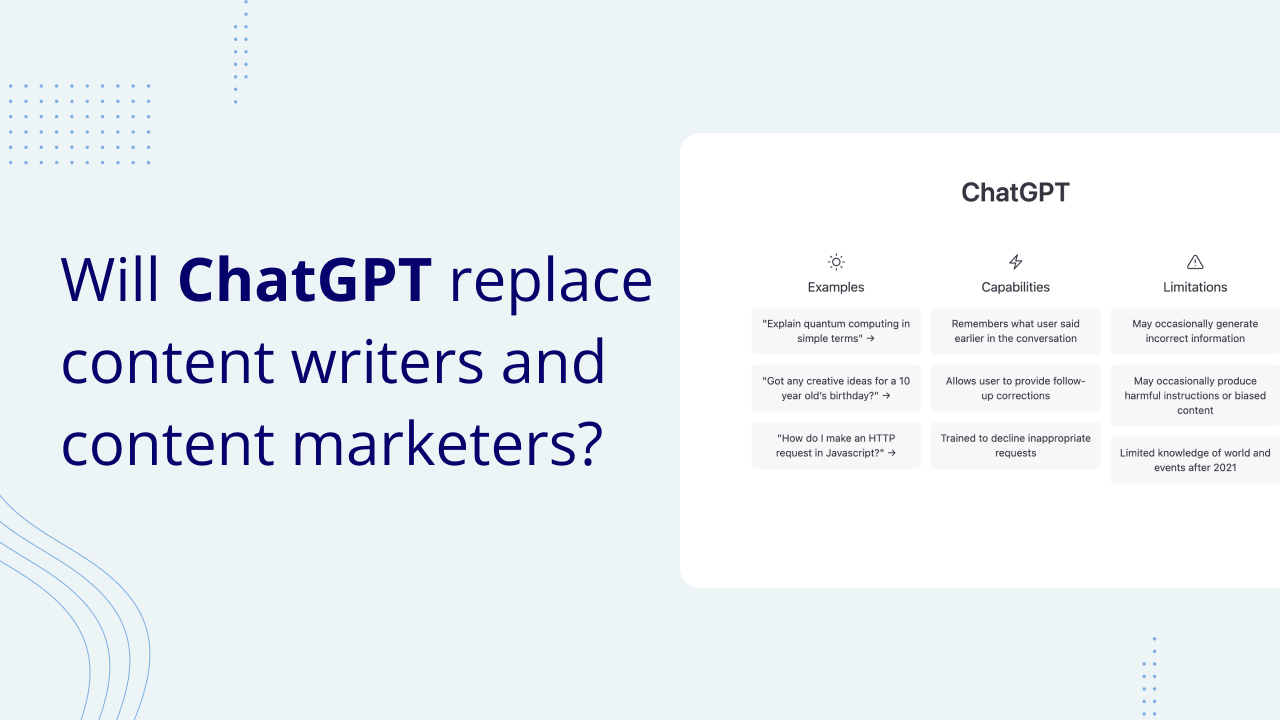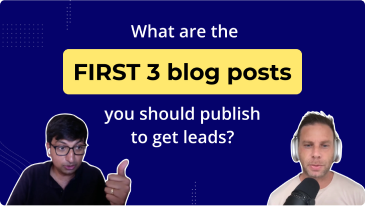Most of the articles written on how to hire a blog ghostwriter provide generic, beginner-level advice that would be very obvious to the people that are most likely searching for ghostwriters: business owners, entrepreneurs, marketing executives, etc.
For example, they discuss how “hiring ghostwriters saves you time on writing,” or state steps of the hiring process (“find the ghostwriter,” “interview the ghostwriter,” etc.), but don’t provide many helpful details or examples on how to actually execute the steps.
Everybody knows (or can figure out) these things. So we wanted to provide a more detailed article about hiring blog ghostwriters that answers important, real life questions, including:
We’ve filtered through 1000+ writer applications and tested and hired dozens of writers for our agency. We’ve ghostwritten for clients or put our own names on the by-line. And we’ve had many conversations with clients about their experiences working with in-house writers, other agencies, or other freelancers. We’ve seen it all, and in this article, we’ll relay as much of that experience as possible.
(Aside: If you’re actually looking for someone to manage the entire content marketing process — i.e., including picking keywords, tracking results, building links, etc. — rather than just writing, you may actually be looking for a content marketing agency and not just a writer. If so, you can learn more about our agency here and reach out about working with us here.)
What Is a Blog Ghostwriter?
A ghostwriter is simply a writer who doesn’t put their own name on the byline, they put yours. But the reality is there is no such thing as a “ghostwriter.” A ghostwriter is just a writer.
At our content agency, sometimes our writers use their own name as the byline for a client article, while other times we use our client’s founder’s name as the byline (or someone else at the company, or the company brand name, etc.). It usually just depends on the preference of our client or the context of the article.
So, with this said, the dynamics of hiring a ghostwriter are the same as hiring a writer: you just want to find the best, with maybe an added requirement that their style is a natural fit for your voice.
Are You Really Just Looking for a Writer? Or Are You Actually Looking for a Content Marketer?
Something we see all the time is companies looking to hire a writer but in reality wanting them to take on every role from search engine optimization (SEO) to data analysis:
Writers and content marketing strategists are not the same! A content strategist (common titles for this role include “Content Marketing Manager” and “SEO manager”) focuses on how to drive long term organic traffic to your business — they think about SEO, keyword research, page rankings, analytics, and more. Writers focus on content creation — the actual article writing.
It’s unrealistic to expect your writer to produce your content strategy, yet many, many businesses do that. Most will not do a good job with both.
If you do find someone who is skilled in both areas, don’t expect to pay them the same rates as you would someone who is exclusively a writer. Again, if you’re looking for full content marketing and SEO strategy (not just blog writing services), you need more than a professional writer. You can look to hire a content marketing manager or SEO consultant or even see if we may be a fit for what you want.
Additional Consideration: Is the Goal of Your Content to Sell a Product or Service?
Asking a writer to produce blog content that’s intended to sell a product or service requires a different skill set than asking them to ghostwrite opinion or thought leadership content, for example.
Specifically, whoever creates your content needs to have the know-how to understand and express your competitive advantages, value propositions, benefits, features, and more. We can tell you from experience that this is a unique skill set, akin to product copywriting, that many freelance writers do not possess.
So, if the type of content you want to create involves selling your product or service, you need to ensure you hire someone that can demonstrate their ability in this area. The hiring process we share below will discuss how you can approach this.
Should You Hire a Freelancer, an Agency, or an In-House Writer?
Typically, these are the three main ways of hiring blog ghostwriters. All have pros and cons, depending on your situation.
Freelance Writers
Hiring a freelance writer is the cheapest option and gives you the potential to flex and scale as you need. Obviously most companies do this and we suggest starting out with freelance bloggers if you haven’t hired writers before. The downside is that you will need someone on your team who can coordinate their freelance writing work and provide editing feedback, although that can often be done with other freelancers as well. We cover our detailed process on how to find and filter for the best ones below.
In-House Writers
Having a full-time, in-house writer can work well for a larger company, if you have the resources. The advantage is that they can become a subject matter expert and are at your disposal whenever you need them. They also can sometimes start crossing the line into being more of a content marketer or SEO if you want and if they’re capable. (Note: Developing subject matter expertise can also be achieved by contractors that do in-depth interviews with their clients when creating content, as we do at our agency.)
The disadvantage, of course, is the salary + benefits + payroll taxes (and other employee overhead costs), which, depending on where your company is located, can be as much as double the base salary of a freelance writer.
Content Marketing Agencies
As we’ve alluded to above, many companies that say they want to “hire writers” are actually looking for a lot more than just writing. They need content marketing or content-based SEO done. They want to open up content and SEO as a lead generating channel. Almost no “freelance writer” is going to single-handedly unlock content as a channel for you.
If this is you, you’re not just looking for a writer, you’re looking to build an entire content marketing operation. As we’ve said above, the key role you need in addition to writing for this, is strategy. We call it ‘content strategy’. It could also be called ‘SEO strategy’. The point is someone needs to manage the process of:
- Picking keywords and topics.
- Coordinating subject matter expert interviews.
- Being a final pass on article quality, proofreading, and on-page SEO.
- Measuring results (leads ascribed to each piece).
Many companies hire an in-house “content marketing manager” or “SEO manager” for this, and that can work. Alternatively, you can hire an agency like ours for this as well. We discuss how we differentiate in this space here.
The Step by Step Process We Use to Hire Writers for Our Agency
Hiring writers is easy. Hiring good writers is hard. And this is even more true when you’re looking specifically for someone to ghostwrite for you because you really need them to nail your voice exactly. So the filtering process below is really important.
Most writer hiring processes involve looking at a few portfolio pieces, and, if someone looks good, immediately putting them on a real piece that will be published on your or your client’s site.
Yes, we look at portfolio pieces too (discussed immediately below) but portfolio pieces aren’t enough. We’ve learned the hard way that you need multiple filters to find the best writers.
Here’s our process:
Step #1: The Application
In the writer application, we…
Ask for Writing Samples (A Portfolio)
Portfolio pieces — while only a start — are the first insight you have into whether this writer is a fit. This is where the vast majority (maybe 80%) of writer applicants are filtered out in our hiring process.
The key, though, is what you look for.
For us, as we’ve mentioned so many times on our blog, we focus on bottom-of-the-funnel, product related content — SEO content that ranks for keywords like, “best accounting software” or “Google Analytics alternatives.” This type of content writing needs to discuss products and features in a detailed and specific way.
So, for us, a good writer needs to be able to contrast value propositions clearly. They need to understand and communicate differentiators between one product and another clearly and persuasively. So that’s what we look for.
For you, it may be that you’re looking to write more top of funnel pieces or thought leadership pieces (don’t mess those up, though). Or that you have a particular style or voice you want the writer to be able to imitate. That’s fine. You’ll have your own criteria.
It doesn’t mean an applicant needs to have a piece that is exactly what you, or we, would publish — most writers don’t. Instead we look for signs in the writing that they can write like you. For us, it’s questions like:
- Have they written about advanced, complex topics?
- Can they sell a product or feature well?
- Do they use a lot of filler, fluff sentences or words?
- Do they start pieces with needless quotes and stats?
- Etc.
We note the applicants that answer these questions well with promising portfolio pieces, and then we look at the next filter.
Ask Applicants to Write a “Mini Sample” on the Fly (Portfolio Pieces Can Sometimes Lie)
Years ago, we used to only use the portfolio piece as the gauge of whether to move a candidate to the test project (Filter #2), but we started to get frustrated at how many writers (some with years of experience) had awesome portfolio pieces but did terribly in the test project. We think this is probably due to the uncertainty of knowing how much of a portfolio piece was actually written by the writer versus edited by their client.
So, to help filter more out at the application stage, we added a final question to the application that acts as a mini test project. We call it the “mini sample”. It asks them to write a few sentences on the fly. Yes, of course they could take the time to study it and carefully write each word. If they do, that’s great — it shows even more dedication. The point is, it’s unlikely anyone will be editing it. So it’s a much more accurate representation of the writer’s ability. They submit it and we see how they think and write.
This has helped a lot.
Make this question as similar to the work you want them to do as possible — just a really short version of it (to respect their time). For example, our question asks applicants to look at a client’s SaaS website and write a short paragraph highlighting the software’s key selling points. We look to see if they can write in our style. You’ll do the same. Most writers should be able to do this in ~15 minutes.
For example, here is a short but good submission for this step from a writer who made it all the way to our team:
Video testimonials convert 25% more buyers, but traditional video production requires a lot of time and money. Vocal Video makes it seamless and easy to record video testimonials, all without a pro. Simply share a link and collect audio and video responses with expertly crafted templates. Vocal Video automatically generates a complete video with your brand’s logo and colors that you can easily embed and share. Sign up for Vocal Video today!
In contrast, here is a submission that immediately told us this write isn’t a fit for us:
Vidyard’s study (https://www.vidyard.com/blog/case-study-videos/) exposed how 89% of marketers experienced video testimonials as the most result-oriented marketing approach.
Have you wondered why people google reviews or alternatives for software? Trust issues!
Will they trust your offer’s attractive promises? They won’t. Only testimonials solve trust issues better, and VIDEO TESTIMONIALS best endorse your offer.
Vocal Video is super easy to use – ZERO editing stress. Generate simple links they’ll only tap on to share your sweet wonders!
So here’s the real question: Are you still letting doubt stop you?
After this step, you can filter applicants by those that have both (a) good portfolio pieces and (b) good mini samples.
But, as we’ve learned the hard way, these applicants still aren’t ready to be put on a “real” client piece. Next comes a more formal, paid test project.
Step #2: The Paid Test Project
For writers who make it through the first step, we have them go through a paid test project that is an exact replica of our actual client work, except it’s a shortened version and won’t actually be used for anything.
It’s important that this be as close to exactly what you need as possible. We use a previously written content piece, one we’ve already published for a client, and give them the same inputs we had when writing it. Then, at the end, we can compare their work to what we produced. We try to use the same one for all applicants so we can benchmark their responses against other applicants as well.
For our test projects, we typically share the angle of the article and ask the writer to produce a list of pain points, a full introduction, and an outline. We don’t need them to write the entire piece because we just don’t need that much written to gauge if they’re a fit. These elements give us enough to evaluate:
- How do they position the client’s product?
- Is it specific?
- Is it in line with our style?
For example, if we asked for a piece on “best accounting software” (for a specific client), we’re looking for something along the lines of, “Most accounting software has X issues which fail to solve Y pain points. Our software solves those pain points in Z way.”
We’re not looking for, “Running a business is hard. After you’ve done HR and sold to customers, you sit down after a long day, and now you’ve got to do the books.”
The first response is specific. The second is general “fluff” content.
But don’t imitate our exact process. You’ll need to provide your writers with the exact same prompt and level of info you give to writers you are currently working with. Again, you want to see exactly how they’d perform “in real life”.
Next, we see how they respond to feedback. We provide one round of revisions via comments or a recorded video, giving detailed explanations of what we’re looking for. We do this even if the applicant’s attempt is poor because, sometimes, they respond really well to our feedback (which is a key characteristic we’re looking for) and their revised version is solid.
The test project should be paid. If it’s not, most good writers will pass on working with you. Right now, we pay $200 per test project. We talk more about how we pay writers below.
Step #3: Writing Real Pieces
Finally, if we’re happy with the test project, we’ll ask the writer to work on several real pieces.
At this stage, only writers that are close to what we need are left, so it should go pretty well but the hit rate even at this stage is not 100%.
Despite all the filters before this, there are still a decent number of writers who don’t work out after working on a real piece. From our experience, that’s just the reality of hiring writers. There is a level of “it’s a numbers game” here. But. if you implement all of these filters, you should be in a lot better shape than the standard, “Portfolio pieces look good, here’s a real piece I need by this date” scenario.
Ongoing Training
Lastly, we should mention that ongoing training and coaching is critical to helping your writers produce great content consistently.
It’s possible to find writers who perfectly match your brand voice and content needs from the beginning, but it’s extremely rare. It’s more likely that you’ll find a talented writer who can ace your projects after some coaching.
At Grow and Convert, our requirements are specific. We’re looking for:
- Clarity of thought in structuring the piece and reasoning through arguments.
- Simple writing style without “fluff”.
- Compelling sales copywriting that’s direct but not over the top.
So, we provide detailed feedback and coaching to all our writers. An experienced content strategist works closely with the writer at every stage, reviewing the questionnaire, giving guidance and providing feedback to the writer. All our content strategists have been writers for Grow and Convert, so they know exactly what they’re looking for. This coaching is obviously heavier in the early stages and tapers down as they get more experience, but almost every writer on our team has been heavily coached by us. We don’t have this false belief that some folks online seem to have: that you can find writers who just happen to write exactly the way you want from day one.
As you’re going through this process, ask yourself whether the writer can:
- Respond well to feedback.
- Make sensible revisions.
- Write on multiple types of brands/topics (if that’s important to your business).
- Hit deadlines.
If they display these characteristics, they will likely work out long-term.
Learn more about our journey by watching our video on How to Hire Great Blog Writers.
Where Can You Find Quality Ghostwriters?
Remember ghostwriters are just writers, so where you source them is the same as where you’d source any writer. We’ve tried every popular route to find writers over the years, with varying success.
Typically, people use one or more of the following:
Writer Marketplace Platforms
Writer platforms such as Upwork, Fiverr, or Crowd Content are popular places for finding writers. While they may include a small number of high quality writers (who will be harder to find), they don’t have a strict filter for freelancers so you have to really implement a strict filter system (like we outlined above) to find quality writers from these pools.
Job Boards
Posting a job listing on jobs boards such as Remote OK, Craigslist, and Wellfound (previously AngelList Talent), can yield some good freelance blog writers, but these are hit and miss. We’ve had more success from dedicated writing job boards (ProBlogger is one of the more established ones).
Social Media
Reaching out on social media platforms such as LinkedIn, Facebook, or Twitter with a job posting can also work as you can get some useful referrals to good writers.
These platforms and routes vary considerably. You’ll certainly find writers but it depends on the dynamics of your particular network on these platforms. We are obviously in the content marketing space so those are the people who follow us and vice versa. Many of them are writers, many more work with writers, so it helps. If you don’t have a network of writers, it may not yield as much. But it’s definitely worth trying.
Writer Job Link on Your Site
Surprisingly, this has been the most effective method of finding good writers for us — more than job boards or marketplace sites. Most of our best team members came from hearing about us through something we wrote or a podcast we were on and saw our “Write for Us” link. Yes, of course, we are a content agency, so we’re more likely to even have writers browsing our site in the first place. But this can still be utilized by product companies or folks not in the marketing space. Writers are people, they check out companies they find interesting. If someone is already on your site for some other reason and happens to be a writer, that’s a pretty qualified candidate — they know, or even may like your company or what you do. Make it easy for those people to see that you’re hiring, in particular hiring writers.
Employee Referrals
Lots of people are writers so lots of people know writers. Referrals of new writers from existing members of our team have arguably been the #1 source of good writers for us. We offer a referral bonus to our team if they refer a candidate that works out as a long term writer for us and we suggest you do the same.
Just remember that whichever platform or sourcing method you use to find candidates, the most important thing is that you implement a good process to evaluate them before they write for your blog.
How Much Should You Pay a Blog Ghostwriter?
Over the last six years, we’ve tried different ways of paying writers. This is what we learned:
- Don’t pay writers by the hour or word count — it may incentivize the writer to string out the project or be unnecessarily verbose so you end up paying more.
- Don’t pay super-expensive rates — we thought writers charging high rates would be really good, but that hasn’t been the case. We’ve paid as much as $1,000 for a piece that we weren’t able to publish. Avoid this costly mistake!
- Don’t pay a writer less than $200 to produce a top blog post — you won’t get what you need. If you’re also expecting them to do content marketing strategy, keyword research, subject matter research, and interviews, you should pay significantly more. We pay $500 for every article.
Our writers are given:
- The keyword — writers don’t have to do content strategy. Our content strategists (who all started off as writers) do that.
- An interview, typically with the subject matter expert — writers aren’t asked to research and become experts themselves. We think that’s nonsensical. They base their pieces on what an actual expert tells us about the topic.
- A kick-off from the content strategist for guidance — writers aren’t left to “get on with it” on their own.
- Supportive coaching and editing expertise from their content strategist — writers can continue to develop their writing skills.
Learn more about how we pay and motivate writers in this article.
P.S. Are you a writer? We’re hiring! Learn more on our ‘write for us’ page.
Working with Grow and Convert
We have an amazing team of content strategists, in-house writers, and freelance writers who all meet our rigorous standards. We can produce product-focused BOTF content that ranks for buying-intent keywords and is optimized to generate conversions and leads, not just traffic.
If you’re a freelance writer and our process and style of SEO, conversion-focused writing appeals to you, consider joining our content marketing team as a writer or content strategist. We have awesome clients. We’re a remote company. We pay well. And you won’t have to stress about getting your own clients.
If you’re a business looking for writing services, you can hire our agency to do SEO-focused content marketing for you. Learn more about our service and pricing here.
You can also learn more from our course which teaches you about our process in greater detail.








